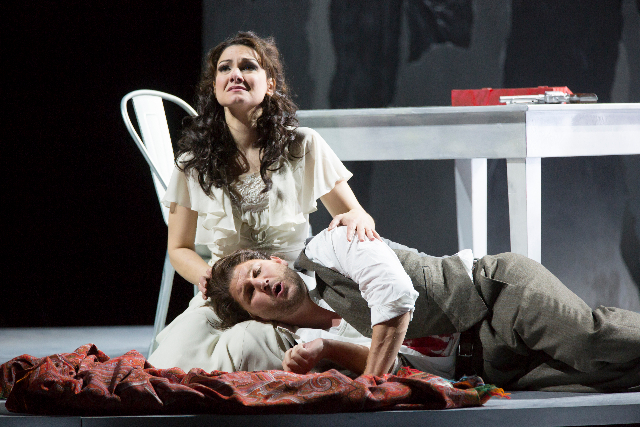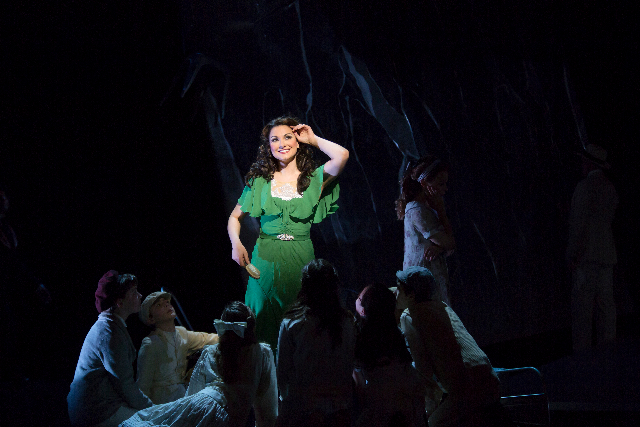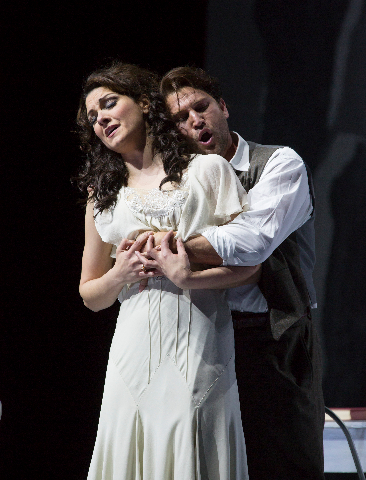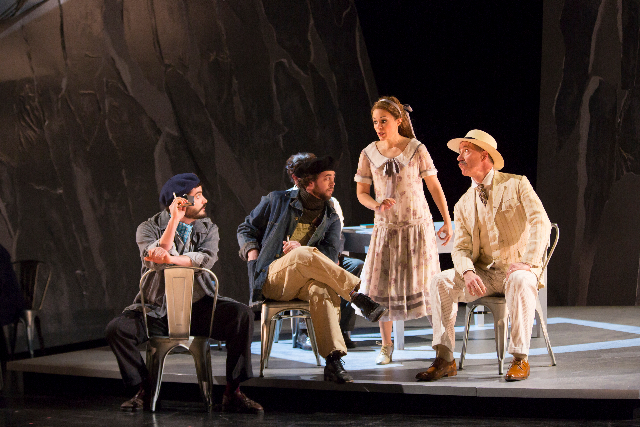BLO Presents Massenet's Werther
Love-sick Poet Who Took His Life Quintessential Romanticism
By: David Bonetti - Mar 28, 2016
Werther
Music by Jules Massenet
Libretto by Edouard Blau, Paul Milliet and Georges Harmann after a novel by Johann Wolfgang von Goethe
First performance, Vienna, 1892
Boston Lyric Opera
Shubert Theatre
March 11-20, 2016
Conductor: David Angus
Stage director: Crystal Manich
Set Designer: John Conklin
Costume Designer: Deborah Newhall
Lighting Designer: Paul Hackenmueller
Video Designer: Greg Emetaz
Boston Lyric Opera Orchestra and Voices Boston
Cast: Werther, Alex Richardson, tenor; Charlotte, Sandra Piques Eddy, mezzo-soprano; Sophie, Rachele Gilmore, soprano; Albert, John Hancock, baritone; the Bailiff, James Demler, baritone; Johann, David McFerrin, baritone; Schmidt, Jon Jurgens, tenor
When asked who was the greatest French poet, novelist Andre Gide, now mostly forgotten, replied, “Victor Hugo, élas.” One could ask similarly who was the greatest French opera composer. One would have to reply, grudgingly, “Jules Massenet, alas.” Sure, there is “Carmen” and Berlioz’s monumental grand opera “Les Troyens” and a few other sundries by Gounod, Saint-Saens, et al. (Not to mention the great French operas of the Baroque-era by Lully, Rameau and Charpentier we have learned to love in recent years thanks to, among other organizations devoted to early music, Boston Baroque and the Boston Early Music Festival.)
But Massenet (1842-1912), who composed some 30 operas, at least five of which survive in the repertory, makes the best claim on our attention. True, I walked out of “Thaïs,” sung by none other than Beverly Sills, because I couldn’t take it for one more minute. And I find “Manon,” long his most popular work, insufferably banal. (Compared with Puccini’s “Manon Lescaut,” based on the same novel, it fails by way of French balance and restraint, lacking the passion that makes Puccini’s early masterpiece so affecting.) But for some reason I do not fully understand, “Werther” is one of my favorite 19th century Romantic operas, an outlier like Tchaikovsky’s “Eugene Onegin” in a territory dominated by Italians and Germans.
So, it was with great anticipation that I attended the Boston Lyric Opera’s production. For all its satisfactions, “Werther” is not, alas, a regular in the world’s opera houses, and I’d heard it live only once, in a bare-boned production some 35 or so years ago with D’Anna Fortunato, a local, soulful mezzo singing a heart-breaking Charlotte. Other than that, CDs, DVDs and Youtube, bless its heart. (Check out the Jonas Kaufmann/Sophie Koch excerpts.)
The BLO delivered a thoughtful, largely successful production based on the conceit that the entire opera was a dream of the poet, Werther, in the moments before he shoots and kills himself over his doomed love for Charlotte. He appears alone during the overture with a gun, which he aims at his chest, and he stays on stage throughout the work, even when he would ordinarily be absent. Such interpretations often create more problems than they solve - for instance, the BLO’s own production a couple of years ago of Wagner’s “The Flying Dutchman” - but here it was an easy stretch that did no violence to the original and underscored the obsessive, love-sick drama at the opera’s heart. John Conklin’s English supertitles stressed the lines in the libretto that cite Werther’s dreamy state. But even if he hadn’t, Massenet’s skillful orchestration, which featured a wistful, yearning love theme, moving in and out of focus, would have made his dreaminess clear.
Conklin designed a handsome production with four disconnected planes forming a room at distorted angles derived from German Expressionist film. The planes were smeared with a silvery gray paint reminiscent of the anti-painting paintings of contemporary Italian conceptual artist Rudolf Stingel. Only the deep green dress of Charlotte, Werther’s fatal love interest, and a few other light touches, violated the somber color scheme. Black and white video images by Greg Emetaz of Charlotte in former, happier states, were projected on the panels, adding layers to the memory-saturated production. The production team, which included stage director Crystal Manich, costume designer Deborah Newhall and lighting designer Paul Hackenmueller, worked together to create a cohesive vision. Why the production was moved to late 1920s Paris from 1780s Frankfurt, which does nothing to clarify the drama, beats me.
"Werther" is basically a chamber opera with only four major characters and a small childrens’ chorus, so it fit easily on the Shubert stage. It is a bourgeois drama about people we can relate to, like Tchaikovsky’s “Eugene Onegin,” Verdi’s “La Traviata” and Puccini’s “La Bohème,” rather than the grand historical and mythological dramas that dominated 19th century opera.
As always, BLO music director David Angus led the orchestra with sympathy, bringing out the work’s unrelenting romanticism without succumbing to sentimentality. And Angus's fresh rereading of the original score led him to discover some 90 seconds of music that had not been published and, as far as anyone knows, ever sung.
The opera is based on one of the great 18th century bestsellers, Goethe’s “The Sorrows of Young Werther,” which inflamed the passions of young men all over Europe, like the Bernie Sanders campaign does today in this country. I don’t know if young people read the novel today, but as late as the late 1960s, one could see young men with tousled hair conspicuously carrying the paperback around campus. I have to admit that I never read it, my Brandeis education largely truncated after two years by the political events of the time, although the school took my tuition and gave me a degree.
The story is simple: Werther, a poet and dreamer, falls in love with Charlotte, a provincial bourgeois, when he serves as her chaperone to a dance. Charlotte returns his affections, and he is in his seventh heaven. However, fate intervenes when Albert, a sober bourgeois, a 19th century dead-ringer for Charlie Baker, returns from his travels. He and Charlotte have been betrothed and, although Charlotte is set into turmoil, she resolves to marry the boring man she promised her dying mother she would wed. Werther is sent into a Romantic tailspin, wooing Charlotte the best he can, going into exile when she banishes him, but sending her letter after letter, which keeps their passion akindle. When he returns at Christmas as she had commanded, he tries to seduce her again, but, a married woman, she sends him away. He takes with him her husband’s borrowed pistols, and shoots himself moments before she bursts into his room for the inevitable liebestod, or love-death, Romantic opera’s favored climax. The difference here is that the man dies and the woman survives. There are subsidiary characters – Charlotte’s father, a bailiff; the eldest of her eight siblings, the adolescent Sophie, who is half in love with Werther herself; and a pair of comic-relief friends of the bailiff, here made to be working men who make out with each other when they get drunk, which is often – but they never get in way of the inexorable drama that leads to Werther’s self-inflicted death.
The problem with the production was the singers’ inability to bring the drama fully to life, although they did their best and had moments that touched the heart. It is the problem in general with the Boston Lyric Opera and other second and third level opera companies that can’t afford to hire the Jonas Kaufmanns and Sophie Kochs of the singing world. And even those that can like the Metropolitan Opera in New York City are brought up short by cancellations, which singers like Kaufmann are wont to make.
(Although the Met is able to call in star-caliber singers like Roberto Alagna to substitute.) Smaller companies do the best they can, luring stars for special productions, placing their bets on rising stars, casting fading stars in specialty roles, nurturing local singers, putting their hopes on lively production values, etc. Sometimes it works, sometimes it doesn’t.
As Werther, the young tenor Alex Richardson looked every inch the Romantic poet, and in the first act, when he sang such lyric paeans to nature as “O nature pleine de grâce” (Oh, nature full of grace,/queen of time and space,/deign to receive a humble mortal,/passing by, who greets you!), his sweet voice promised a terrific evening. But as his hopes of eternal love with Charlotte were crushed, he struggled to make the same impression with music that required a more dramatic voice. A lyric tenor, Richardson should think twice about taking on more dramatic roles until his voice deepens and darkens.
The problem was the reverse with the evening’s Charlotte, mezzo-soprano Sandra Piques Eddy. In the early scenes when she falls inconveniently in love with Werther, her low-lying mezzo struggled to express the carefree love she feels, but later when she marries Albert out of duty rather than love and is torn by her love of Werther, she uses her lower, more passionate, more expressive voice to deeply affecting effect.
As Sophie, soprano Rachele Gilmore was largely weak of voice, although she sang the insipid ditty – Massenet at his typical worst – “Du gai soleil” with innocent charm. (“From the bright sun, filled with flame,/in the glowing air,/a pure radiance comes down/from our heads into our souls. Everyone is joyful!/Gladness is in the air!”) As the Bailiff, baritone James Demler was appropriately gruff. Baritone John Hancock, who sang Albert, was the best overall singer of the evening – too bad his role was so minor and emotionally one note. As the Bailiff’s friends, baritone David McFerrin and tenor Jon Jurgens, both members (or alumni) of the BLO’s admirable Emerging Artist program, were fine. Although a fault of the production team was to make the Bailiff’s friends a pair of working class drunks with the hots for each other. A man of the Bailiff’s position would never associate with such louts.
The opera switches into high gear, reaching musical and dramatic greatness, in Acts III and the brief Act IV, which are played together without a break.
Act III opens with Charlotte’s famous letter scene, in which she ruffles through the many passionate letters Werther has sent her during his exile, affirming his love, torn between reading them yet another time or tossing them in the fire. (In the BLO production, letters are scattered across the set and the projections feature letters falling like giant snowflakes from the sky.)
It is Christmas Eve and she anticipates his return. “Werther! Werther!” she cries out with passion. “Who could have foretold/the place he holds in my heart today!/Since he left, everything, despite myself,/is wearisome, and my thoughts are full of him!” From there the outburst moves into an extended scena, including dialogue with Sophie, in which she begs to be allowed to have her tears, and a series of short arias, each expanding on the pain she feels at the heart of her love. It is one of the great moments in late-Romantic opera, and Eddy had her finest moment of the evening with it.
That would have been enough to make the opera memorable, but Werther appears, not missing a moment, acting on her command to return at Christmas. The two have an awkward scene, their love held back because of circumstances. Charlotte reminds him that he was translating the poet Ossian before she sent him away; he picks up the book, but instead of reading from it, he launches into one of the most moving and insinuating arias in the tenor repertory, “Pourquoi me réveiller,” (Why awaken me, O breath of Spring?), the tragedy of which, alas, Richardson was not able to plumb with his light, lyric voice. But he did his best, he hit the notes, but he also didn’t move the audience to the depths the aria demands. Still, I left the theater with its melody in my mind where it remained for days after.
The final death scene is touching, but in it Massenet plays his French card, pulling back from the full tragedy of Werther’s death. He is neither Wagner (“Tristan und Isolde”) nor Verdi (“Otello”). And when Werther seems safely and tragically dead, Massenet brings him back for one more exchange with Charlotte, telling her where he would like to be buried, unfortunately ending the opera on a maudlin note. But we’ll always have “Pourquoi me réveiller.”
BLO ANNOUNCES 2016-17 SEASON:
One of the big questions in the ongoing Boston theater crisis is where the BLO will present its productions next season after its nearly two-decade lease at the Shubert ends. Now, we no longer have to wonder: The company has released its 2016-17 schedule and the venues where it will play – and it turns out that it is taking a self-conscious tour of historical Boston theaters.
The opening production, Bizet’s “Carmen,” might seem boring to opera aficionados, but this is a “Carmen” with a difference. It is a co-production with the San Francisco Opera, a major league company, and it will be directed by Spanish superstar, Calixto Bieito, in his American debut. (It will be done in San Francisco first in May.) What’s most intriguing is that it will be presented from Sept. 23 to Oct. 2 at the Boston Opera House, the former vaudeville theater the legendary Sarah Caldwell bought for her opera company, arguably the most exciting company during its day in America. The production will be set in post-Franco Spain and it, alas, will have a different cast from San Francisco’s, but Jennifer Johnson Cano, the woman in the red dress in the BLO’s “Don Giovanni” promises to be an exciting Carmen.
Impresario Don Law, who has turned his Opera House into a showcase for Broadway road shows as well as the home for the Boston Ballet, said in a prepared statement, “Bringing the Boston Lyric Opera and this glorious production to the Boston Opera House is a dream of ours. It’s been 25 years since true professional opera has been produced here, and we are eager for the return of spectacular, exciting opera performance to our stage.” Should we read anything more than what it says into this statement?
The annual Annex production will move down Washington Street to the Emerson/Paramount Theatre, where the BLO will present “Greek” by the British provocateur Mark-Anthony Turnage of “Anna Nicole” fame. Based on a play by Steven Berkoff, itself based on “Oedipus Rex,” the opera is set in London’s East End during the 1980s. The dates are Nov. 16 to 20.
From March 12 to 19, the BLO will occupy the Emerson Cutler/Majestic Theater with a production of Igor Stravinsky’s “The Rake’s Progress.” The cast will include Kevin Burdette who has left lasting impressions – positive! – with the BLO in the past and Jane Eaglen, one of the leading Brunnhildes of our time, now living in Boston and teaching at the New England Conservatory. Although her role is not cited in the BLO release, one cannot imagine her singing anything other than the flamboyant Baba the Turk. Can’t wait.
Closing the season will be Mozart’s perennial favorite, “The Marriage of Figaro” from April 28 to May 7 at John Hancock Hall in the Back Bay. Director Rosetta Cucchi, who led the company’s brilliant resetting of “La Bohème” during the 1968 student uprisings in Paris, should have something interesting up her sleeves. Does she know about Caldwell’s radical late 1960s (or was it early ‘70s?) production at the Shubert, in which the aristocrats were all sung by white actors and the servants by black?






